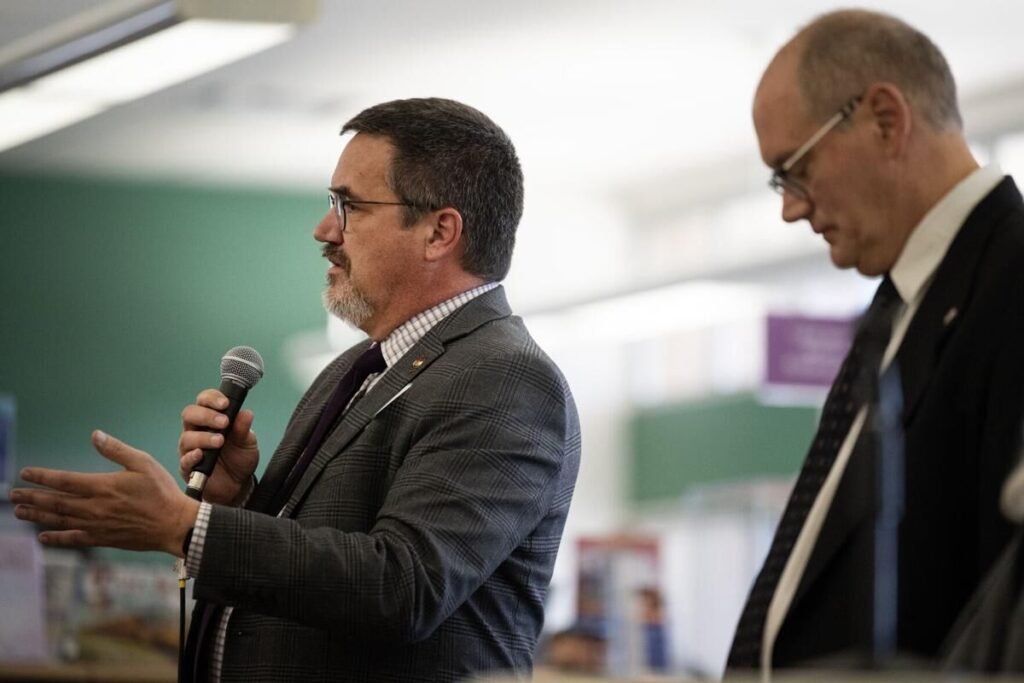Colorado Supreme Court recognizes defendants may appeal magistrates’ probable cause rulings
Addressing an issue never previously decided, the Colorado Supreme Court clarified on Monday that criminal defendants do have the right to appeal a magistrate’s decision that probable cause exists to hold a trial on the charged offenses.
Colorado law provides for preliminary hearings, whose purpose is to screen out cases where prosecutors do not have probable cause to believe the defendant committed a crime. The legislature has given the right of a preliminary hearing to those who are accused of serious felonies, at which a judge or a magistrate may preside.
In contrast with county court and district court judges, who the governor appoints and voters retain, magistrates are hired by each judicial district to assist with workloads. Sometimes, parties may consent to have a magistrate hear their case. Other times, a magistrate can hear certain matters without consent — like preliminary hearings for probable cause.
The question for the Supreme Court was whether a magistrate who finds probable cause to bring a criminal defendant to trial has issued an order that is generally unreviewable — the same as if a judge made the decision — or if a defendant can instead appeal the ruling to a judge, as happens with other types of magistrate decisions.
Justice William W. Hood III, in the March 25 opinion, acknowledged that ordinarily, a judge’s probable cause determination is not subject to immediate appeal.
“But, without meaning any disrespect or diminishing the critically important work they do, magistrates aren’t judges,” he wrote, concluding defendants can seek review of magistrates’ probable cause orders after all.

Multiple district attorney offices, covering jurisdictions with both large and small populations, told Colorado Politics their districts do not use magistrates to hold preliminary hearings in the first place. Jeff Chostner, the elected district attorney for Pueblo County, said he did not anticipate the clarification would significantly affect his office.
“I do support the Supreme Court’s decision finding that preliminary hearings may be appealable to a district court judge,” he said.
In the underlying case, Arapahoe County prosecutors charged Carlos Ray Maes with various theft-related charges last year. In May, Maes appeared for a preliminary hearing. Instead of a county court judge, Magistrate James Quinn conducted the hearing and decided probable cause existed for Maes’ alleged offenses.
Maes then petitioned for a review of Quinn’s ruling, leading to a hearing in September before District Court Judge Darren Vahle. Everyone agreed that if a county court judge had conducted the probable cause proceedings, Vahle could not hear the appeal. But because the decision maker was a magistrate and the parties had not consented, Maes’ lawyers believed there had to be an additional level of oversight.
Vahle called it an “interesting argument,” but he did not think he had the authority to review Quinn’s decision.
“What I think is significantly missing from that is any case in Colorado that says a district court should review a probable cause finding from a preliminary hearing when it’s a magistrate,” he said.

Deputy county attorney Rebecca P. Klymkowsky presents her oral argument to the justices of the Colorado Supreme Court in the County of Jefferson v. Beverly Stickle case during Courts in the Community on Thursday, Oct. 26, 2023, at Gateway High School in Aurora, Colo. (Timothy Hurst/Denver Gazette)
Maes appealed directly to the Supreme Court, arguing magistrates fall under the supervision of the district courts, yet it was unclear whether magistrates’ allegedly faulty probable cause rulings have any level of oversight.
“Magistrates are simply not judges. And, therefore, a different set of rules applies to decisions by magistrates, as compared to decisions by a county or district court judge,” wrote Maes’ public defenders.
The Colorado Attorney General’s Office, representing Vahle, countered that decisions made at preliminary hearings are, by definition, preliminary and not the type of “final order” normally subject to appeal. The 18th Judicial District Attorney’s Office added that Colorado law permits prosecutors to appeal dismissals of charges from probable cause hearings, but nothing authorized a similar appeal for a defendant.
The prosecution also warned that if defendants in Maes’ shoes could appeal, probable cause hearings could become much more detailed and evidence-heavy than they are meant to be — with the goal of protecting the magistrate’s decision from reversal on appeal.
The Supreme Court was unmoved by the idea that permitting defendants to appeal only in the limited circumstances where a magistrate makes a decision without the parties’ consent would undermine the structure of preliminary hearings.
“Here, allowing review of magistrates’ probable-cause determinations will result in some delay to the pre-trial process in those jurisdictions that use magistrates to preside over preliminary hearings,” Hood wrote. “But protecting the delegation of judicial power under the Colorado Constitution and honoring defendants’ due process rights outweigh those delay concerns.”
The case is People v. Maes.













